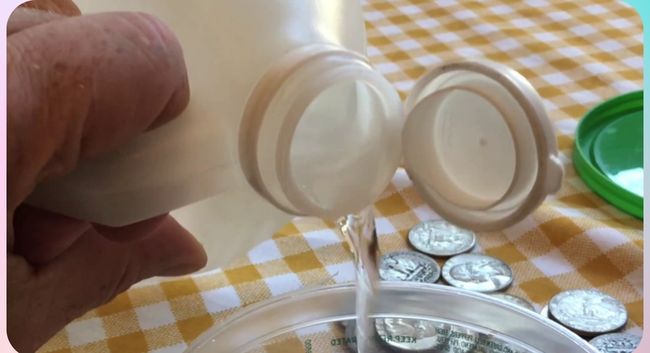Can I Use Vinegar to Clean Silver Necklace?
If you have a silver necklace that needs a good clean, you may be wondering if vinegar will do the trick. Vinegar is a great natural cleaner, so will it work on cleaning a silver necklace?
Yes, it's a quick restoring process for silver necklaces. You can use vinegar as one of the ingredients in the cleaning solution.
Will White Vinegar Damage Silver?
No, white vinegar will not damage silver. In fact, white vinegar is often used as a natural cleaning agent for silver jewelry and other silver items.
When mixed with water, it forms an acetic acid solution that can help remove tarnish from silver.

How Do You Clean a Silver Necklace With Vinegar?
If your silver necklace is looking a little dull, you can clean it with vinegar.
Here’s how:
- Step-1: Fill a bowl with warm water and add 1/4 cup of white vinegar.
- Step-2: Soak your silver necklace in the bowl for 10 minutes.
- Step-3: Remove the necklace from the bowl and use a soft cloth to wipe it down, then rinse it off with clean water.
- Step-4: Dry your necklace off with a soft towel and admire its new shine!
What is the Best Way to Clean a Silver Necklace?
When it comes to cleaning a silver necklace, there are a few different methods that you can use.
One popular method is to use a solution of warm water and dish soap. Simply add a drop or two of dish soap to a bowl of warm water and then submerge your silver necklace in the mixture.
Let it soak for a few minutes before using a soft cloth to gently wipe away any dirt or grime that has built up on the surface.
Another method that you can use is to make a paste out of baking soda and water. This paste can be used to scrub away any stubborn dirt or grime on your silver necklace.
Simply mix together equal parts baking soda and water until you have a thick paste. Then, rub this paste onto your silver necklace using circular motions. Once you have scrubbed away all of the dirt, rinse your necklace off with clean water and dry it with a soft cloth.
If your silver necklace is extremely dirty or tarnished, you may need to use a commercial silver cleaner. These cleaners are designed specifically for cleaning silver jewelry and will not damage the delicate metal.
Be sure to follow the instructions on the cleaner carefully, as some require that you rinse the piece off with clean water afterwards while others do not.
What Happens When You Put Vinegar on Silver?
When you put vinegar on silver, a chemical reaction occurs that produces silver chloride. Silver chloride is a white solid that is insoluble in water.
When silver chloride comes into contact with light, it turns dark gray or black. This reaction is called tarnishing. Vinegar is an effective way to clean silver because it contains acetic acid, which dissolves silver chloride.
However, vinegar can also damage silver if it is left on for too long. Therefore, it is important to rinse the silver thoroughly with water after cleaning it with vinegar.
If you are looking for a more gentle cleaning solution, you can try using baby shampoo instead. Baby shampoo is milder than vinegar and will not damage the silver.
Simply wet a soft cloth with baby shampoo and wipe the silver down. Rinse the silver with water and dry it with a soft cloth. You should notice that your silver looks shiny and new!
Tips To Maintain Your Silver Necklace
Silver is a popular choice for jewelry because it's beautiful and affordable. However, silver can tarnish over time if it's not properly cared for.

Here are some tips to help you keep your silver necklace looking its best:
- Avoid exposure to water, perfume, and other chemicals. Water can cause silver to tarnish, so be sure to remove your necklace before showering or swimming. Perfume and other chemicals can also damage silver, so put your necklace on after you've applied them.
- Store your necklace in a cool, dry place. A jewelry box or drawer is a good option. If you're traveling, store your necklace in a Ziploc bag to protect it from moisture and dirt.
- Polish your necklace with a soft cloth. This will help to remove any tarnish that has developed. You can also use a commercial silver polish, but be sure to follow the instructions carefully.
- Don't wear your necklace all the time. Over time, the friction from clothing can wear down the silver and cause it to lose its shine. When you're not wearing your necklace, store it in a safe place where it won't get damaged.
- Have your necklace professionally cleaned every few years. A professional jeweler will have the tools and expertise to clean your necklace without damaging it.
- Inspect your necklace regularly for signs of damage. Look for scratches, cracks, or other damage that could cause the silver to tarnish more quickly. If you notice any damage, take your necklace to a jeweler for repair as soon as possible.
By following these simple tips, you can keep your silver necklace looking like new for many years to come!
Toothpaste to Clean Silver
Looking to clean your silver without harsh chemicals? Turns out, toothpaste is a great way to clean your silver jewelry and flatware!
Here's how:
Toothpaste works well for cleaning small areas of tarnish on silver. Just apply a pea-sized amount of toothpaste to a soft cloth and rub the cloth over the tarnished area in a circular motion. Be sure to rinse the piece thoroughly with water afterwards and dry it with a soft, lint-free cloth.
For larger areas of tarnish, you can make a paste with equal parts baking soda and water. Apply the paste to the tarnished area with a soft cloth and rub in a circular motion until the tarnish comes off. Rinse well with water afterwards and dry completely.
How to Clean Silver Jewelry with Vinegar
Bottom Lines
As as you can see from our earlier discussions above, You can use vinegar to clean your silver necklace. This is a great way to avoid using harsh chemicals on your jewelry.
Vinegar is an effective, natural cleaner that will leave your necklace looking shiny and new. Give it a try the next time you need to clean your silver jewelry!






















